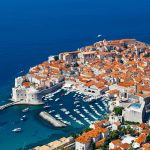ZAGREB, April 3, 2019 – Refugee protection nongovernmental organisations on Wednesday published their fifth report on violent and illegal push-backs of refugees from Croatia and systematic human rights violations on the EU’s borders, demanding that the Croatian Ministry of the Interior and the Police Directorate stop interpreting Croatian and EU laws in a selective and ill-intentioned way.
Collective, unlawful and violent police push-backs of refugees on Croatian borders have continued despite consistent warnings by numerous international and domestic organisations, representatives of the Centre for Peace Studies, Are You Syrious?, the Welcome Initiative and the Italian Consortium of Solidarity (ICS) told a news conference outside the Ministry of the Interior in Zagreb.
Tea Vidović of the Centre for Peace Studies and the Welcome Initiative said that collective refugee expulsions definitely happened and that no one questioned that any more.
“All testimonies indicate that systematic and organised collective push-backs of refugees from EU territory are happening,” said Vidović.
Apart from such testimonies, the NGOs’ report also includes a legal analysis as to how Croatian and EU laws should be interpreted and why actions by the Ministry of the Interior are unlawful.
Antonija Potočki of the Are You Syrious NGO said that they were speaking in the name of some 10,000 women, children and men who were expelled from Croatia in 2018 alone.
Many of them were given a “Croatian welcome”, which, according to numerous testimonies, included brutal beatings with truncheons, punching and kicking, stripping refugees naked, taking their water and food supplies, threatening them with weapons, shooting, theft and destruction of refugees’ personal items, and illegal and violent push-backs of families, minors, and sick and elderly people, Potočki said.
Matej Iscra of the ICS said that his organisation had collected the testimonies of several asylum-seekers on a number of cases of illegal expulsion by Italian police in the period from June to October 2018.
All the cases were characterised by strong arbitrariness on the part of Italian police and the fact that they were chain expulsions, with Italian police handing over migrants to Slovenian police, who handed them over to Croatian police, who returned them to Bosnia and Herzegovina, Iscra said.
The migrants testified about verbal and physical abuse by Croatian police during the process of expulsion. Italian police said that public security officials in Trieste described those procedures as correct and as readmission, Iscra said.
The refugee protection NGOs published their first report on unlawful refugee expulsions in 2016.
More news about migrant crisis can be found in the Politics section.








